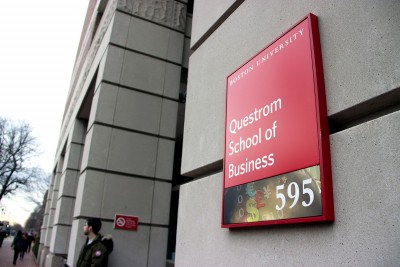
Boston University’s Questrom School of Business released findings from its “Business Education Jam” workshop, a global online conversation about improving the future of business education that took place Sept. 30, 2014 through Oct. 2, 2014.
The report, titled “Reimagining Business Education: A World of Ideas,” analyzes findings from the “Business Education Jam” workshop, which included 4,000 participants from 40 industries, 300 academic institutions and 93 countries, according to a Thursday press release.
Steven Davidson, assistant dean of Questrom, said the report summarizes the key ideas and conversations from the forum held in fall 2014.
“This new report will help us to further refine our approach as it highlights key trends and opportunities,” he said. “In today’s world, businesses are changing and business students should seek out a quality, rigorous and relevant educational experience. We seek to produce highly capable leaders who can make an impact on the world. We will continue to foster an academically rigorous curriculum and build strong industry relationships.”
Technology company IBM sponsored the Jam, which featured several guests from the industry who led conversations in the forums, The Daily Free Press reported on Oct. 6, 2014.
Some of the areas highlighted in the report include the need to focus on research, technology, collaboration, ethics and entrepreneurship, the release stated.
Paul Hutchinson, an organizational behavior professor in Questrom, said the report shows that the Jam was a great way to properly evaluate how students can learn to become business leaders.
“One of the values of coming to Questrom is getting the skills you need for the workplace,” he said. “What I have seen from looking through the Jam results and the experience of it is that employers want [students with] experience … A student who is empowered and prepared does well in the workplace and builds great companies and serves the community well.”
Paul Carlile, a professor who teaches information systems in Questrom, said he likes that the Jam values experiential learning, or “live cases.”
“We have already determined that this direction will be a key focus for us,” he wrote in an email. “The particulars we need to determine are what companies are the best to partner with since these types of partnerships are new to business education and then what challenges provide the best teaching opportunities; for what programs … and what courses or subject matter areas need to be involved in delivered ‘live’ cases.”
Several Questrom students said the Jam is a step forward into understanding how the school can improve business education.
Pooja Kalapurakkel, a sophomore in Questrom, said while she did not participate in the Jam, the results from the forum are important as they add to the ongoing conversation about the future of business education.
“The Business Jam, since it promoted innovation and connections with global leaders, is reflective of my business education,” she said. “Questrom encourages innovation and a global perspective, and the Business Jam seemed to be a different way of promoting this … [However], I do wish that we learned more about a variety of specific industries so that we could be more prepared when choosing possible careers.”
Rachel Harrison, a freshman in Questrom, said she is excited about the way the school is working to adapt and maintain relevance in an ever-changing business world.
“I feel like getting those professionals in [Questrom] really influence people as far as what careers they want to do, and by getting those big companies in here, it keeps [Questrom] relevant,” she said. “It keeps those professionals coming into [Questrom] looking at prospects. [Questrom] is worldwide known.”
William Cara, also a sophomore in Questrom, said he is impressed by the results of the Business Education Jam.
“Changing and improving the Questrom curriculum in accordance with the ebb and flow of the real business world is very beneficial,” he said. “Learning through experience has always been very meaningful to me. This educational philosophy is what attracted me to the BU business school in the first place … the economic environment is constantly changing with the presence of technology and advanced communication. It’s sink or swim.”



